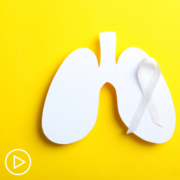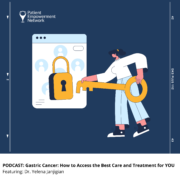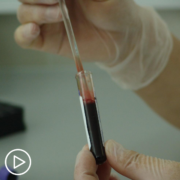Personalized Lung Cancer Treatment | Key Factors to Consider
Personalized Lung Cancer Treatment | Key Factors to Consider from Patient Empowerment Network on Vimeo.
How is lung cancer therapy personalized? Dr. Erin Schenk, a lung cancer specialist and researcher, reviews important factors and considerations that affect therapy choices, including lifestyle and patient preference.
Dr. Erin Schenk is a medical oncologist, lung cancer researcher, and assistant professor in the division of medical oncology at the University of Colorado Anschutz Medical Center. Learn more about Dr. Schenk.
See More From INSIST! Lung Cancer
Related Resources:

An Expert Explains Predictive Biomarker Testing for Lung Cancer |

|

|
Transcript:
Katherine Banwell:
Personalizing therapy involves taking into account a number of patient factors. What should be considered when deciding on a treatment regimen for a given patient?
Dr. Erin Schenk:
Uh-huh, yes. That’s a great question and one that is really important in formulating a treatment plan. So, some patients because of their health status, for example, aren’t able to undergo surgery, and that happens. And so, occasionally sort of their health status maybe their lungs don’t work as well as they used to or the heart doesn’t pump as well as it used to.
You know, those sorts of health concerns can help us tailor and personalize treatments to what would be the most – the safest but also the most effective approach. Occasionally patients have another long-term chronic disease where using immunotherapy might be more dangerous than helpful because they’re sometimes autoimmune diseases.
Especially ones that affect the brain, so for example multiple sclerosis can be one of those or disease that affect the lungs, you know, interstitial lung diseases. Those would put a patient at great risk of receiving immunotherapy, but outside of the health status, it’s also important I think to talk about what your preferences are as a patient as well.
Because sometimes we will come to you and say, “Here are these multiple different choices and what’s important to you or maybe what you’re worried about or what you’re concerned about are considerations that we want to hear about and understand so that we can talk you through the process and help make some of these decisions.” You know, for example, if you’re receiving chemotherapy plus radiation together for your cancer care that can be a huge time commitment.
What I mean by that is when patients get radiation in certain circumstances, that can be once a day every day, Monday through Friday for six weeks at a time and sometimes patients have challenges with transportation. Or sometimes they have you know, challenges balancing a job or childcare or other things like that. So, these are all part of the – just part of bringing it all together and putting together a treatment plan that makes sense for what we understand about the lung cancer itself, but also what we understand about you as our patient.
You know, how can we make changes or make suggestions that would best fit for you and your needs?
Katherine Banwell:
When should patients consider a second opinion or even consulting a specialist?
Dr. Erin Schenk:
I think any time it’s appropriate. We – at our institution, we’re one of the main lung cancer centers that – you know, within several hundred miles, so we frequently see patients and sometimes it’s just to check in and say you know, the patient says, “Here’s what my team has started me on. You know, what do you think should be the next approach?” and we talk about that, but really anytime I think is appropriate for reaching out for another set of eyes to look at things. I would say perhaps some of those most critical times would be prior to treatment starts especially if – yeah, I would say prior to starting a treatment with that new diagnosis.
That would be a really critical time because often again, sometimes once we start down a treatment path, we’re in some ways we’re committed, but if that maybe isn’t the optimal treatment path based on, you know, the tumor and the biomarkers and the patient preference starting on that less optimal treatment path could potentially hurt patients in the long run. So, I would say at – you know, potentially at diagnosis when a treatment course is recommended and then if there is a need to change treatments.
So, for example, especially in the metastatic setting there are certain therapies widely available. People are very familiar with them, can start them no problem, but when those treatments stop being beneficial that might be a time to also meet with a specialist or go to a lung cancer center of excellence to get their opinions on what to do next.










